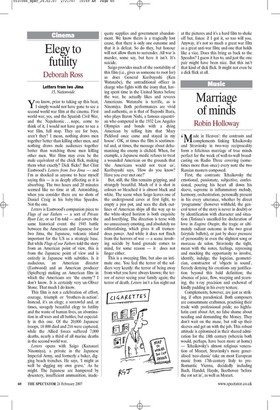Elegy to futility
Letters from Iwo Jima 15, Nationwide you know, prior to taking up this beat, I simply would not have gone to see a second world war film at the cinema. First world war, yes, and the Spanish Civil War, and the Napoleonic ... nope, come to think of it, I would not have gone to see a war film, full stop. They are for boys, aren't they? I mean, nothing draws men together better than killing other men, and nothing draws male audiences together better than watching those men killing other men. War films may even be the male equivalent of the chick flick, making them what exactly? Dick flicks? But Clint Eastwood's Letters from Iwo Jima — and I'm as shocked as anyone to hear myself saying this — is as deeply affecting as it is absorbing. The two hours and 20 minutes seemed like no time at all. Astonishing, when you consider there are no shots of Daniel Craig in his baby-blue Speedos. Not the one.
Letters is Eastwood's companion piece to Flags of our Fathers — a sort of Private Ryan Lite, or so I'm told — and covers the same historical event: the 1945 battle between the Americans and Japanese for Iwo Jima, the Japanese, volcanic island important for the US as a strategic base. But while Flags of our Fathers told the story from an American point of view, this is from the Japanese point of view and is entirely in Japanese with subtitles. Is it audacious, an American director (Eastwood) and an American producer (Spielberg) making an American film in which the Americans are 'the enemy'? I don't know. It is certainly very un-Oliver Stone. That much I do know.
This film is not a celebration of effort, courage, triumph or 'brothers-in-action'. Instead, it's an elegy; a sorrowful and, at times, savagely beautiful elegy to futility and the waste of human lives, an abomination in all wars and all battles, but especially in this one. Of the 20,000 Japanese troops, 18 000 died and 216 were captured, while the Allied forces suffered 7,000 deaths, nearly a third of all marine deaths in the second world war.
Letters opens with Saigo (Kazunari Ninomiya), a private in the Japanese Imperial Army, and formerly a baker, digging beach trenches. He says, 'I might as well be digging my own grave.' As he might. The Japanese are hampered by dysentery, insufficient ammunition, Madequate supplies and government abandonment. We know theirs is a tragically lost cause, that there is only one outcome and that it is defeat. So do they, but honour will not allow them to surrender. All war is murder, some say, but here it isn't. It's suicide.
Saigo provides much of the rootability of this film (i.e., gives us someone to root for) as does General Kuribayashi (Ken Watanabe), the untraditional officer in charge who fights with the irony that, having spent time in the United States before the war, he actually likes and reveres Americans. Watanabe is terrific, as is Ninomiya. Both performances are vivid and authentic, as is that of Tsuyoshi Ihara, who plays Baron Nishi, a famous equestrian who competed in the 1932 Los Angeles Olympics and bonds with a dying American by telling him that 'Mary Pickford once came and stayed in my house'. OK, at times the film is sentimental and, at times, the message about dehumanising the enemy is cliched. When, for example, a Japanese medic refuses to treat a wounded American on the grounds that `the Americans would not treat us', Kuribayashi says, 'How do you know? Have you ever met one?'
But, still, the film remains gripping, and strangely beautiful. Much of it is shot in colours so bleached it is almost black and white. The scene when Saigo leaves one of the underground caves at first light, to empty a piss pot, and sees the dark outlines of American ships all the way up to the white-skyed horizon is both exquisite and horrifying. The direction is terse with no unnecessary emoting, and absolutely no editorialising, which gives it all tremendous power. And while it does not flinch from the horrors of war — a scene involving suicide by hand grenade comes to mind, for some reason — it does not linger either.
This is a sweeping film, but also an intimate one. You feel the terror of the soldiers very keenly: the terror of being away from what you have always known; the terror of never seeing your family again; the terror of death. Letters isn't a fun night out at the pictures and it's a hard film to shake off but, listen: if I got it, so too will you. Anyway, it's not so much a great war film as a great anti-war film; and one that holds like a vice. Does this bring us back to the Speedos? I guess it has to, and just the one pair might have been nice. But this isn't that kind of dick flick. It might not even be a dick flick at all.






















































 Previous page
Previous page